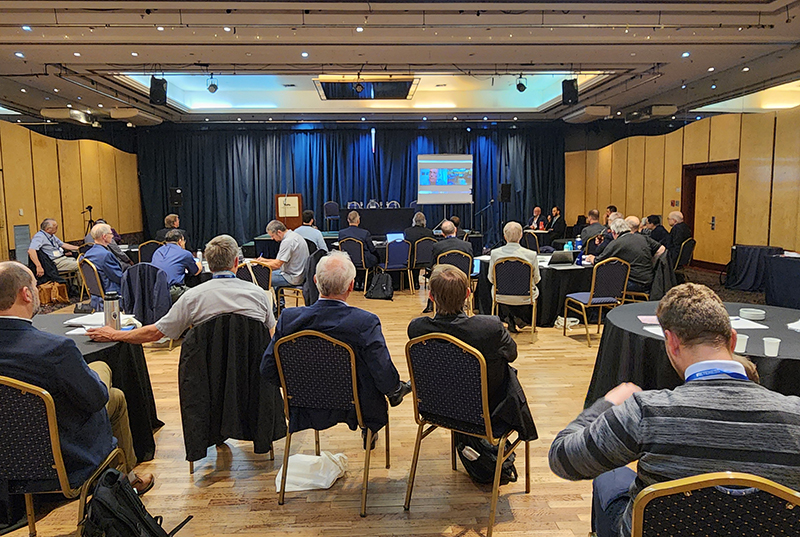
ARGENTINA – The World Seminaries Conference continued during the afternoon of June 12 with a presentation on issues surrounding identity and identity politics.
Rev. Dr. Boris Gunjevic of Westfield House, Cambridge (United Kingdom) gave a lecture entitled “Crucifixion of Identity: Resurrection of +”. Dr. Gunjevic gave his talk via livestream.
“Once we were persons,” Dr. Gunjevic began. “Now we are reduced to identities. How did this happen?” Dr. Gunjevic went on to explain the development of the concept of personhood—tracing it from the classical period, through the patristic era, and into the middle ages—vis-à-vis the concept of identity (which was originally just “one aspect of a person”). “Person and identity are intertwined,” Dr. Gunjevic explained, “since person is a metaphysical category and not only a psychological category as we are used to think in late modernity.”
Over time, persons became reduced to “subjects” and then “legal entities simply called ‘corpi’—bodies,” Dr. Gunjevic noted. “Subjects became ‘disciplined bodies’ under authority of the state.” Eventually, we become also the “self.” “The process of transformation of person into subject and subject into self,” Dr. Gunjevic said, “and the process of individual becoming identity… is one process observed from different points of view.”
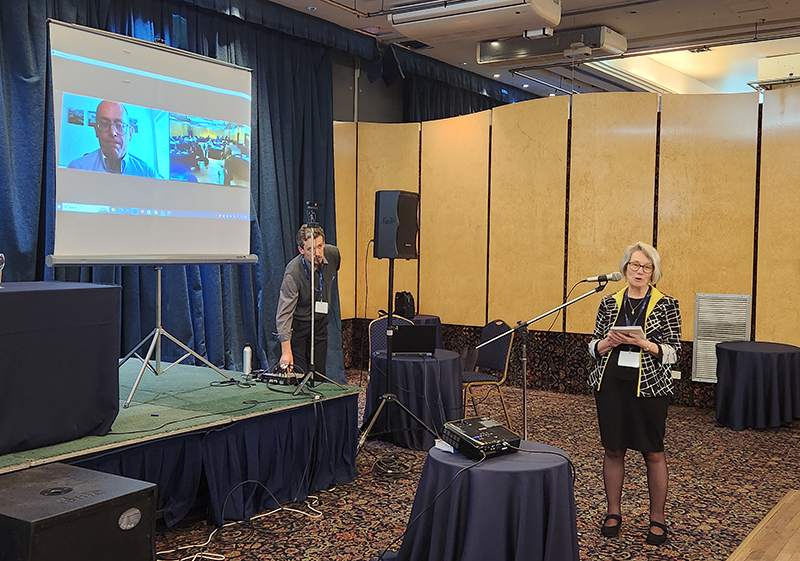
Contemporary culture diminishes people into identities—both those self-chosen by the individual but also by wider society. “It’s not just how I identify,” he continued, “but also how I am identified by others.”
But the Christian understanding of “identity” is dramatically different, as articulated in Galatians 3:25-29. “The resurrection of Jesus [is] the beginning of a new creation, which is the birth of a new humanity—something that has not been seen before.”
“Paul claims that uniquely distinctive properties”—that is, our “identities”—of being a member of a certain class, sex, race, or social status should be questioned” as a result of “the new creation that is on the eschatological horizon,” Dr. Gunjevic explained. “These identifies are simply deactivated, and we say together with Paul that they should be crucified to be resurrected.”
“There is something very undignified about labeling a human being as an identity, to put him in a box… and then tell them how to perform this identity in life,” Dr. Gunjevic argued. Christians ought not reduce themselves—nor allow themselves to be reduced—to anything less than Paul’s vision in Galatians. “To be crucified with Christ… represents what it means to live from faith to faith,” he said. “It is a slow process of becoming a new unknown identity that is neither more nor less than the refusal of any identity and all forms of identification.”
“In Christ as a new creation, we received the dignity of true uniqueness, of someone who is singular,” Dr. Gunjevic continued. “If I am crucified with Christ and I live in the power of His resurrection this means that I crucify my identity with everything that I called mine.”
In a world which desires to reduce people to identity politics, Dr. Gunjevic encouraged Christians to reject all such identities—and to do so subversively by reclaiming the “+” (or plus) from the initialism “LGBTQ+”. “Instead of being one or other identity, we should choose the +,” he said, “since Jesus was crucified on the +.”
“This + is the cross with which we must identify ourselves,” he continued. “As a Church faithful to preach Law and Gospel, we should reject any form of identity politics, any form of identity. We should accept the position that human sexuality, or any form of social, economic, and political relations should be embraced by the cross and crucifixion.”
“In times when people are possessed with the problem of identity, refusal of any identity is perhaps the only identity that we as Christians can claim,” Dr. Gunjevic concluded.
Plenary discussion touching on Christian anthropology followed.
Regional Reports
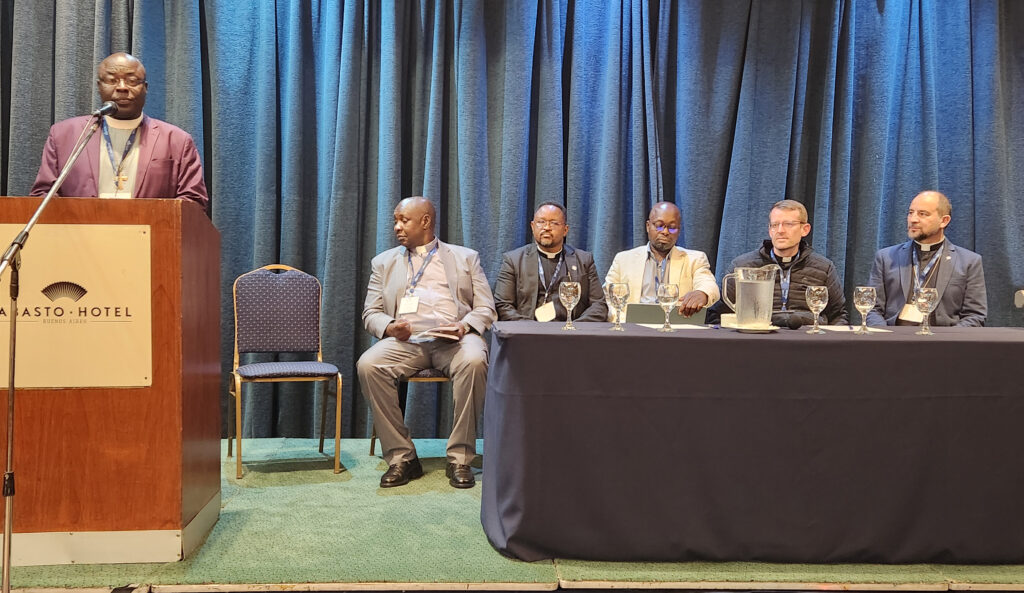
The afternoon concluded with regional reports from Africa, North America, and Latin America.
Rev. Dr. John Miruka, Deputy Principal of Neema Lutheran College in Kenya, presented a summary on behalf of the African region, noting similar challenges among many members: challenges with accreditation; limited resources; and growing church bodies, requiring increased need for training pastors and deacons. Other participants gave a brief report focusing on their individual institutions: Rev. Dr. Ebenezer Boafo of Ghana’s Lutheran Theological Seminary; Rev. Dr. Heinz Hiestermann, Rector of South Africa’s Lutheran Theological Seminary in Tshwane; Azouma Djougue Yembore, Administrator of the Centre Luthérien d’Études Théologiques in Togo; Rev. Dr. Daniel Mono reporting on plans to open a seminary in his diocese in Tanzania; Rev. Volmir da Rocha, Principal of the Lutheran Theological College Uganda; and Dr. Miruka on Neema Lutheran College in Kenya, along with its Principle, Rev. Dr. Joseph Tom Omolo.
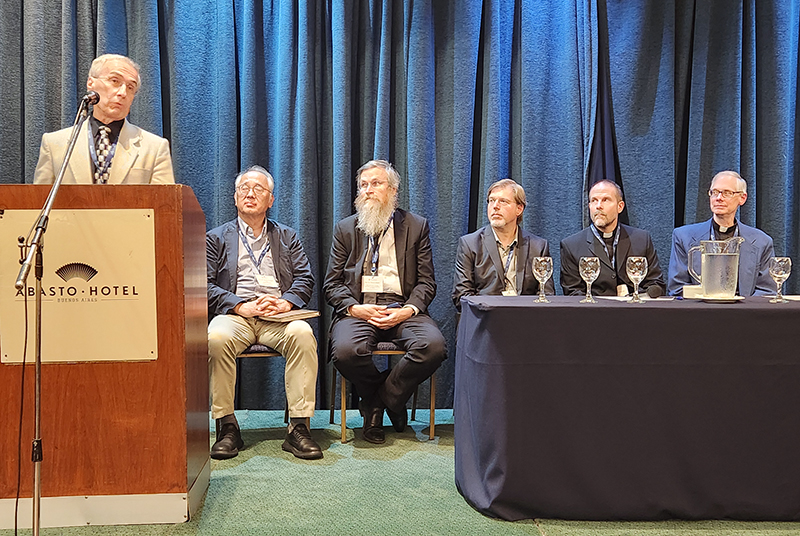
North American representatives reported next, with each speaker highlighting challenges and opportunities in their current situation. Commonalities between some of the seminaries included changes in seminary leadership, faculty changeover, and some positive news about student recruitment. Representatives from the United States spoke first: Rev. Dr. Ronald Mudge, Provost of Concordia Seminary (St. Louis, Missouri); Rev. Dr. Naomichi Masaki, Professor of Concordia Theological Seminary (Fort Wayne, Indiana); and Rev. Dr. Chris Caughey of the American Lutheran Theological Seminary. Representatives of Canadian seminaries spoke next, including Rev. Dr. James Kellerman of Concordia Lutheran Theological Seminary (St. Catharines, Ontario) and Rev. Dr. Joel Heck, Interim President of Concordia Lutheran Seminary (Edmonton, Alberta).
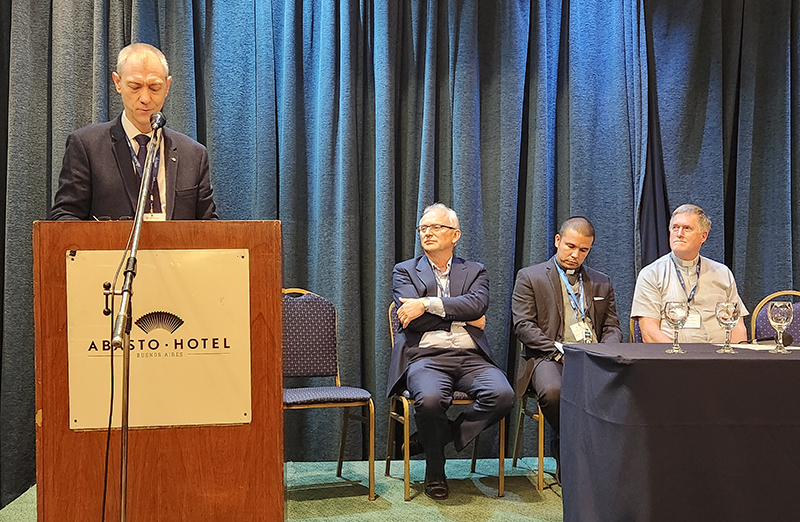
The Latin American region presented last, with Rev. Dr. Sergio Schelske, Director of Seminario Concordia in Argentina introducing their region. A written report from Chile was read, with apologies about not being able to attend in person due to another event in their church body. Brazil’s seminary also sent its regrets, as their church body and seminary are still dealing with the effects of devastating flooding in Brazil. The rest of the members reported on their own situations individually: Rev. Rev. Eliezer Mendoza, Director of Instituto Teológico Juan de Frías in Venezuela; Rev. Eugenio Wentzel, Director of the Instituto Biblico Adolfo Dilley in Paraguay; and Rev. Prof Antonio Schimpf of Seminario Concordia in Argentina.
A service of vespers followed, with Rev. Dr. Ebenezer Boafo, Principle of the Lutheran Theological Seminary – Ghana, preaching.
Alternatives to the Classical Seminary
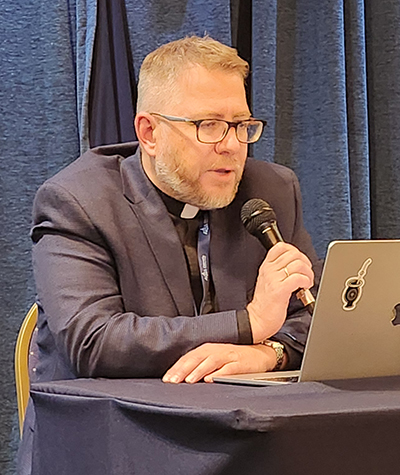
After supper, participants enjoyed a sectional by Rev. Dr. Alexei Streltsov of the Theological Seminary of Siberian Evangelical Lutheran Church in Russia. Dr. Streltsov spoke on “Training Pastors in a Post-Christian World: Are there any Alternatives to the Classical Seminary?”
With seminaries in some places in the world becoming less and less viable, Dr. Streltsov suggested it would be wise for Lutheran churches to prepare a “Plan B” to ensure the continued training of pastors in the event traditional residential seminary education becomes impossible. “What do we do when seminaries no longer promote correct doctrine and practice, or if seminaries are no longer viable and have major sustainability issues?” Dr. Streltsov asked. He suggested the answer lies in a master-apprentice model—a model derived from Christ and His own disciples—through which the content of a traditional seminary education might be safeguarded even as the method of delivery changes. In such a system, bishops and pastors could direct the studies of individual students in a “decidedly personal character of preparation for the ministry.”
Such a plan has many positives, he explained, but should be regarded as a secondary option. “Solid and prosperous seminaries doing their work should continue their operations,” Dr. Streltsov said. “If it ain’t broken, don’t fix it.” But for churches in difficult circumstances—in the midst of persecution or in places where residential seminary programs become impossible—the master-apprentice model should be seriously considered.
———————
Find more news on the ILC’s 2024 World Seminaries Conference here.
